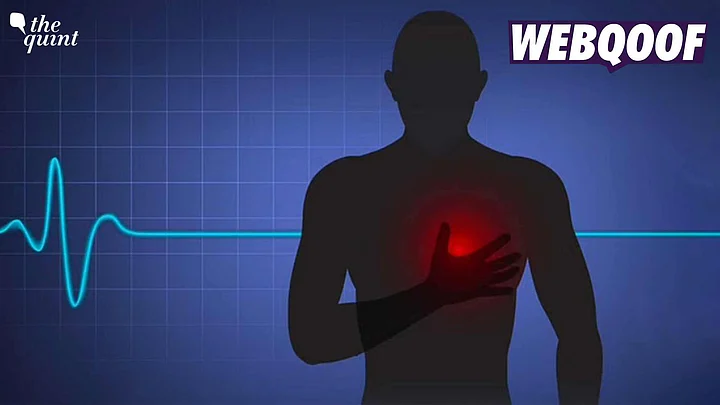Nearly 1.7 crore (17 million) people died due to cardiovascular diseases (CVD) in the year 2019, which accounts for 32 percent of all global deaths, as per the World Health Organisation (WHO).
However, most heart diseases can be prevented by managing behavioural risk factors such as an unhealthy diet, tobacco use, excessive alcoholism, obesity, and a lack of physical activity.
Experts believe early detection is important, but there remains a lot of misconception about heart diseases, who does it affect, and how to recognise the warning signs.
This World Heart Day, we spoke with Dr Manish Hinduja, consultant – cardiothoracic and vascular surgery, at Fortis Hospital, Mulund, and debunked some of these myths.
Myth 1: Heart Attack is the Same as Cardiac Arrest
Many people confuse a heart attack with a cardiac arrest and vice versa. However, these are two different things.
Dr Hinduja explains that a cardiac arrest is an arrest in the activity of the heart, which means that the action of heat beating and regularly pumping blood.
When this activity stops, then it’s called a cardiac arrest.
A heart attack is a blockage in the blood supply of the heart. There are coronary vessels which supply the blood to the muscles of the heart, if those get blocked, then the person gets a heart attack.
"To understand it simply, a cardiac arrest is the electrical failure when there is no activity of the heart, whereas a heart attack is a circulatory failure. So, a heart attack is one of the reasons behind cardiac arrest, but not all cardiac arrests are due to heart attacks."Dr Manish Hinduja, Consultant – Cardiothoracic and Vascular Surgery
Myth 2: Heart Attack Is the Only Form of Heart Disease
A common myth around heart ailments is that a heart attack is the only form of a heart disease. But as opposed to this, there are several other heart diseases like cardiomyopathy, holes or extra vessels in the heart, tumours in the heart, etc.
Speaking to us, Dr Hinduja said that there are several types of heart diseases but the adult population most likely suffers from a heart attack.
When a person undergoes a heart attack, he/she experiences a blockage in the blood flow, unlike other heart diseases.
Myth 3: Heart Attack Only Impacts Old People
We often associate heart attacks with older people rather than the younger population. But a heart attack can be experienced by any age group.
Dr Hinduja said, "It (heart attack) is also commonly seen in the young population now. In fact, a heart attack is caused by the deposition of cholesterol inside the blood vessels, it has been found that this deposition usually starts in teens, between the age of 10 and 20."
He also added that one of the main reasons for experiencing a heart attack at a younger age is due to a change in lifestyle.
Some of the most common causes of heart blockages and heart attacks in this age group are excessive stress, poor eating habits, smoking, bad posture, and sitting for long hours at a stretch.
According to the data provided by the National Crime Records Bureau (NCRB) in 2021, out of the total 28,449 deaths due to heart attack, 2,730 were seen in people below 30 years of age and 25,719 were noted in the 30 and above age group.
Myth 4: Heart Diseases Aren't Hereditary
Like many other diseases, heart diseases are also hereditary, although the seriousness of the heart disease can vary.
If heart diseases run in a person's family, it is likely that there is a 30 to 40 percent chance that the person will suffer from a heart disease too.
"The person will have suffered from the disease at a younger age as compared to his/her parents. So if the father had a heart disease at the age of 70, then it is likely that the child will have it at the age of 60 and the grandchildren might have it at the age of 50."Dr Manish Hinduja, Consultant-Cardio Thoracic and Vascular Surgery
Myth 5: Heart Failure Can't be Treated
A common myth about heart failure is that it can't be treated. According to the National Health Service (NHS), heart failure is a "long-term condition that can't be cured" but it states that the treatment can help keep "the symptoms under control, possibly for many years."
Dr Hinduja says, "There are various ways of managing heart failure, once the patient is labelled as someone having heart failure, we treat them in either of the two ways. One, we find out the aetiology of heart failure and second, we check what are the symptoms of the heart failure. We figure out why the patient has heart failure – whether it is because of coronary artery disease (blockages in the heart), heart attack, cardiomyopathy, or hypertension."
A patient's heart failure can be treated in two ways – one way is the use of medicines, which will decrease their symptoms, and the other way is the surgical and interventional treatment.
The long-term solutions include heart transplantation and using a ventricular assist device (VAD) and the temporary solutions include using a mechanical circulatory assist device like the extracorporeal membrane oxygenation (ECMO).
(Not convinced of a post or information you came across online and want it verified? Send us the details on WhatsApp at 9643651818, or e-mail it to us at webqoof@thequint.com and we'll fact-check it for you. You can also read all our fact-checked stories here.)
